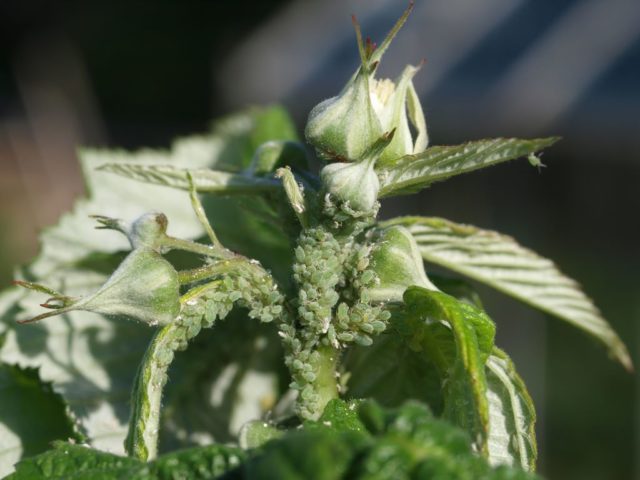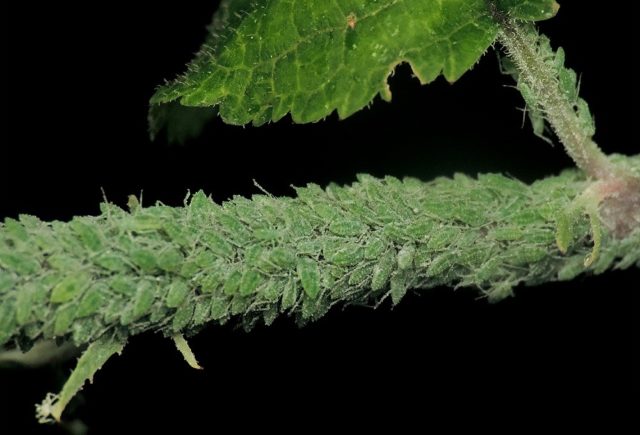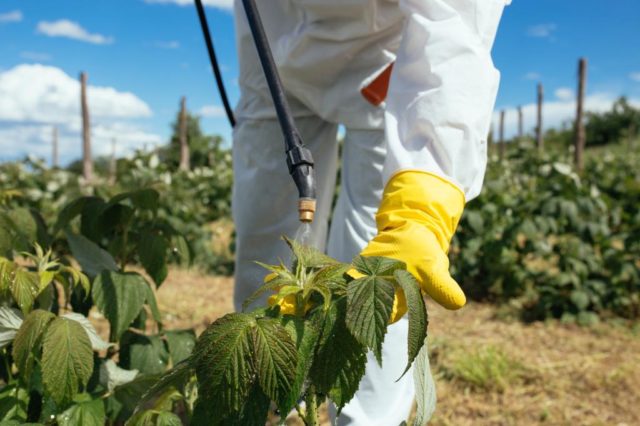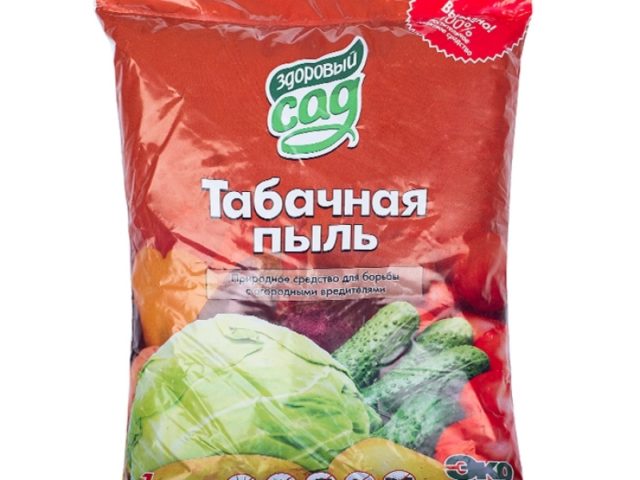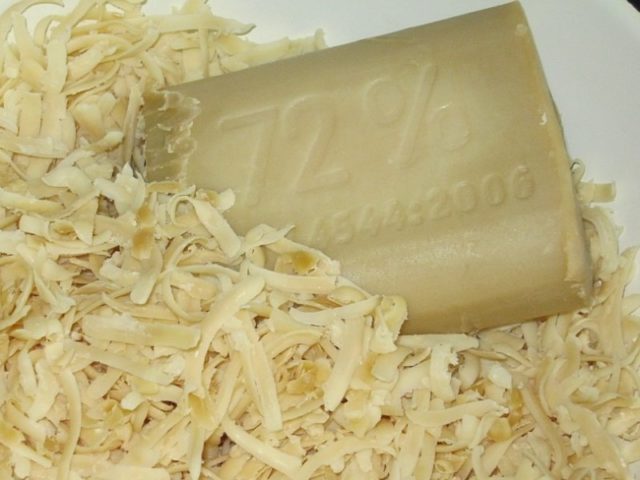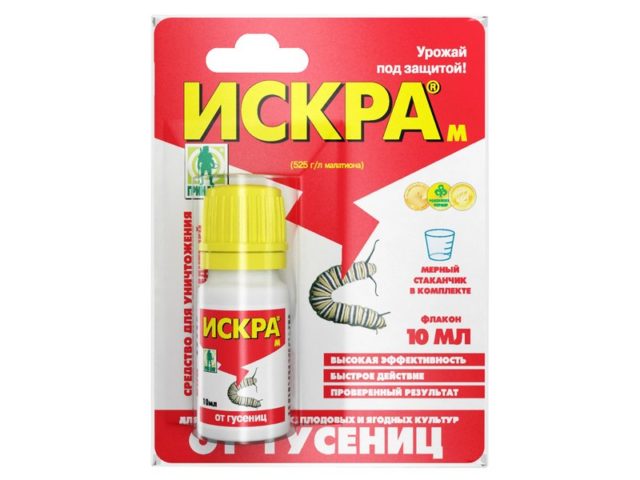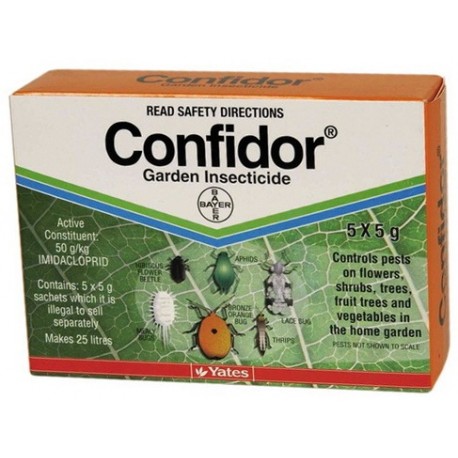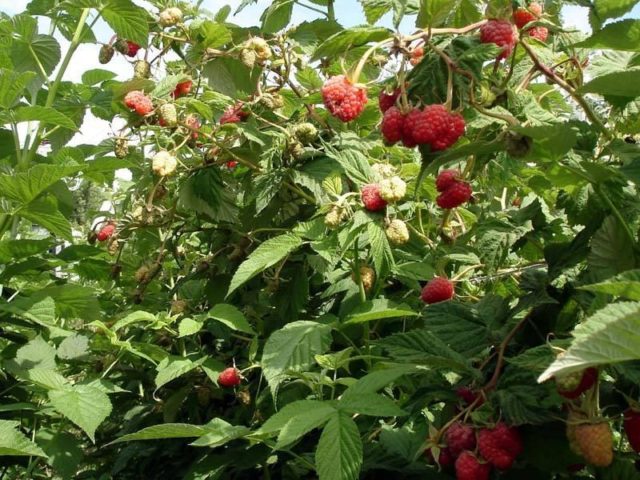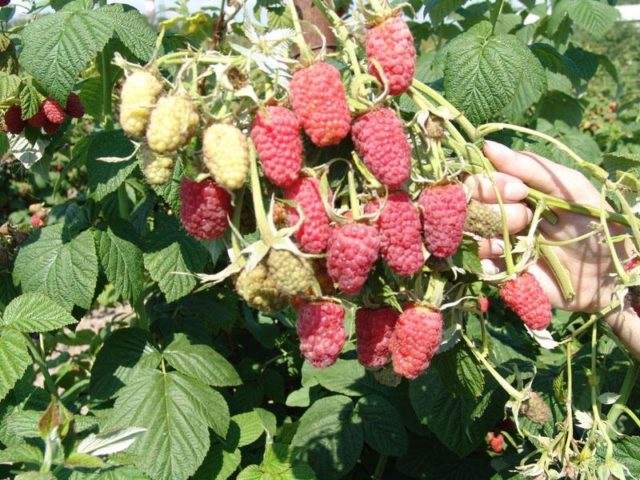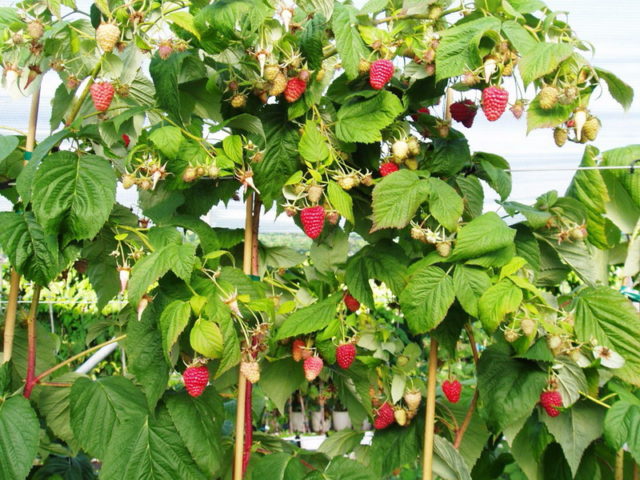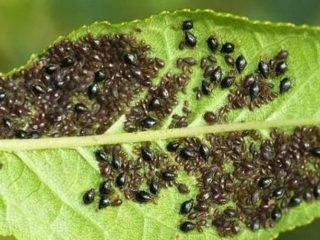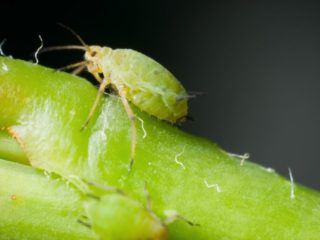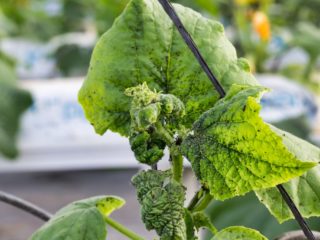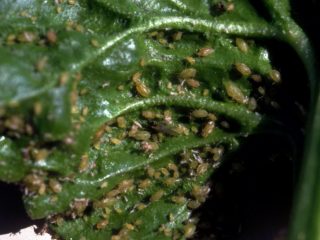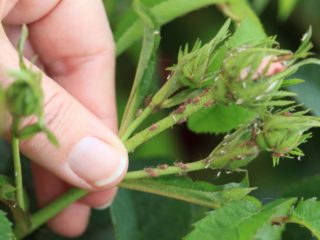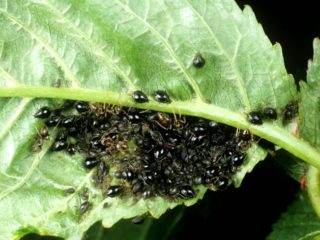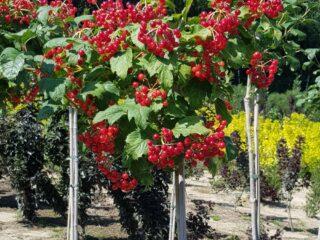Content
- 1 Why is it dangerous for aphids to appear on raspberries?
- 2 Ways to control aphids on raspberries
- 3 How to treat aphids on raspberries using folk remedies
- 4 Treating raspberries against aphids with fungicides
- 5 Protecting raspberries from aphids in different seasons
- 6 Raspberry varieties that are highly resistant
- 7 Prevention measures
- 8 Conclusion
Aphids are one of the most common pests of garden and vegetable crops. Withstanding low temperatures, the insect easily survives winter. With the onset of warm weather, aphids quickly multiply and infect all parts of the plant. You can fight aphids on raspberries using drugs and traditional methods.
Why is it dangerous for aphids to appear on raspberries?
There are about 5,000 species of aphids in nature. Some of them are attached to one type of plant, others can feed on any plant sap. Winged and wingless aphids easily mix along the stems, quickly spreading throughout cultivated plantings.The structure of the mouth allows the insect to easily pierce the leaf blades and stems of young plants. Aphids do not disdain the juice of raspberries. The pest enters the site from infected plants or neighboring areas. Ants also supply aphids to the garden. They feed on insect milk, creating entire farms of small pests.
Aphids leave a sweet sticky coating (jelly) on the bushes. This substance attracts other pests that are not averse to feasting on the sap and tissues of the plant.
Aphids are very dangerous for raspberries. Colonies of pests destroy not only the berry crop, but also young shoots. Aphids can also cause infection of raspberry bushes with fungal diseases. If you do not treat the plantings with special means in a timely manner, then you can say goodbye to the harvest.
Raspberries are most often affected by two types of aphids - shoot and leaf.
It is worth treating bushes against aphids when the first signs of their activity appear.
- The leaves curl and dry out.
- Flowers do not open fully and fall off.
- Fresh shoots lose growth and gradually dry out.
- The berries become deformed and fall off.
To prevent the berry harvest from being damaged, pest control should begin as early as possible.
Ways to control aphids on raspberries
The choice of methods to combat aphids on raspberry bushes depends on the time of year, the phase of plant development and the number of pests.
The bushes are treated with chemicals to prevent aphids before flowering and after picking the berries. Most folk methods can be used to control insects all year round.
It is necessary to follow the principles of berry bush agricultural technology to protect against aphids and other pests.
Often, biologically active preparations that contain bacteria and fungi hostile to insects are used to protect plants.
Adherents of organic farming and safe means of pest control for garden and vegetable crops recommend planting repellent plants around the raspberry tree.
How to treat aphids on raspberries using folk remedies
The choice of folk remedies for treating berry gardens against aphids is quite wide. The main advantage of such methods is relative safety for humans and the environment. But the effectiveness of traditional methods of treatment against aphids is not very high.
Garlic water
To prepare an infusion of garlic, you can use the arrows that are removed when growing this pungently aromatic crop or mature heads. To prepare a liter of solution you will need 200 - 250 g of raw materials. Garlic must be crushed with a meat grinder or blender to a pulp and add water. Then leave for about 3 days.
Strain the resulting infusion and dilute with an equal volume of water. Spray raspberry leaves and shoots against aphids.
Hot pepper
To treat raspberries against aphids, you can use hot pepper pods or its powder. For a liter of infusion you will need 1 ripe pod or a teaspoon of red pepper seasoning. There are two ways to prepare a folk remedy to treat aphids on raspberries.
- Grind the pod, pour boiling water over it and simmer for about half an hour. Leave to steep until completely cool.
- Pour red pepper powder into a glass of hot water and leave for an hour, wrapping the container in a warm towel.
To spray against aphids, dilute the resulting infusion in a ratio of 1 to 10. Apply to shoots, leaves and peduncles.
Onion infusion
Mash half a kilogram of unpeeled onions and add warm water (5 l). Leave in a warm place for 24 hours. Strain the infusion and squeeze out the onion porridge.
To spray raspberries against aphids, dilute the product with an equal volume of water.
Tobacco dust
In hardware stores, the product is sold ready for use. You can fight aphids on raspberries with a dry preparation or infusion.
- Prepare a bag from gauze in several layers. Sprinkle tobacco dust and lightly tap to pollinate the raspberry bushes.
- An infusion is prepared from 500 g of dust per 5 liters of hot water for two days. Dilute the product with water and spray the raspberry bushes.
Infusion of tomato tops
Gardeners use tomato shoots to prepare aphids on raspberries and other crops. The green mass (2 - 3 kg) is poured with hot water (10 l) and left for several days in a warm greenhouse. The product can be boiled. In this case, the cooking process is accelerated. A sign that the infusion is ready is the appearance of foam. The liquid must be drained and diluted with water in a ratio of 1 to 2.
An infusion from potato tops is prepared in a similar way. It is known that the greens of nightshade crops contain small amounts of toxic substances that aphids cannot tolerate.
Laundry soap
To combat aphids on raspberries and other crops, unscented laundry soap is used. You should grind a bar of soap and dilute it in a bucket of water. The resulting alkaline solution does not cause addiction among pests. It can be used an unlimited number of times for processing
Soap is also used to increase the effectiveness of home remedies against aphids.It has good adhesion. If you add a small piece of soap to any home remedy for fighting aphids on raspberries, then even rain will not wash away substances that are toxic to the pest from the plant.
Rules for processing raspberries with folk remedies
The natural composition of home remedies to combat aphids does not mean that they are absolutely safe. If hot pepper gets into your eyes or mucous membranes, it can cause a burn. And preparing a solution from tomato and potato tops can lead to an allergic reaction. Therefore, even using such simple components, you should not neglect protective equipment.
Plants should be treated in dry weather. The ingredients in home remedies against aphids do not penetrate the plant cells. They are easily washed off by rain. To protect raspberries from aphids, it is advisable to choose a time in the morning when the sun dries the grass from dew. The processing efficiency also decreases in strong winds.
To protect raspberries from aphids using folk remedies, you need to treat the bushes every week.
Treating raspberries against aphids with fungicides
Gardeners make the mistake of treating plants with fungicidal preparations. These products are suitable for protecting plants from diseases. To kill aphids on raspberries and other garden crops, experts recommend treating the garden with insecticides.
To get rid of aphids for a long time, but at the same time maintain the productivity of raspberry bushes, you should remember:
- Raspberries are pollinated by bees. Bushes should not be treated with chemicals against pests during flowering, as they are also dangerous for beneficial insects.
- Systemic preparations are most effective against aphids on raspberries. They penetrate plant cells, destroying insects almost instantly.
- The shrub should be processed in dry, windless weather, even if the instructions for the product do not contain this information.
- Aphids are highly resistant to toxic components. To effectively combat aphids on raspberries, it is not recommended to use drugs with identical composition several times.
Spark
The domestically produced insecticide is available in several versions.
- Iskra M - in the form of a concentrated emulsion, contains malathion. A contact-intestinal insecticide with a pungent odor kills aphids within a few hours. A 10 ml ampoule is diluted in 10 liters of water and the plants are sprayed with a fresh solution. The crop should not be treated with the drug during the flowering and fruiting period.
- Golden spark - Available in several types. To treat raspberries, insecticide liquid and powder are used. The nicotinoid imidacloprid is used as an aphid paralyzing substance. Its components are low-hazard for humans and the environment. The insecticide remains in plant parts for up to a month. It is recommended to process raspberries no later than the flowering period.
- Spark Double Effect — made on the basis of natural pyrethrins, which contain flowers of the Asteraceae family. The drug can be used to treat raspberries at any time, except during the fruiting period. Substances do not penetrate the plant and do not accumulate in it.
- Spark Bio - the safest product from the line of insecticides. It is based on Avertin.According to the instructions, plants can be treated with the biological preparation during the flowering and berry picking period. The drugs Fitoverm, Strela, Jaguar, Aktofit have a similar effect. The biological structure of the products is safe for humans, warm-blooded animals and bees. The components decompose under the influence of natural processes.
Confidor
The systemic insecticide contains imidacloprid. According to research, the components of the drug penetrate exclusively into the leaves, without affecting the fruits and berries. This property allows you to process raspberry bushes throughout the growing season.
The preparations Monsoon, Imidor, Biotlin have a similar composition. Insecticides based on neonicotinoids can be used to treat raspberry bushes against aphids not only by spraying, but also when watering the plants.
Protecting raspberries from aphids in different seasons
When choosing means and methods for protecting raspberries from aphids, it is necessary to take into account the seasonality and degree of infestation of plants.
Treating raspberries against aphids in spring
From early spring until the formation of flower buds, raspberries can be treated with any means to combat aphids. Systemic and contact insecticides with a long period of action will destroy the pest and have time to decompose before flowering begins.
What to do if there are aphids on raspberries during flowering
Most insecticides are universal. They have the same effect on harmful and beneficial insects. Therefore, it is not worth treating bee-pollinated raspberries with them. To protect blooming raspberries, it is recommended to use biological preparations with a short period of protection or folk remedies.
Control of aphids during fruiting period
If aphids appear on raspberries during the period when the berries are ripening, then you will have to be careful when choosing products. Even low-hazard insecticides can cause poisoning or an allergic reaction in humans.
You can treat raspberries against aphids using traditional methods. Gardeners spray the bushes with a decoction of chamomile. The flowers of the plant contain peritroids, which negatively affect the nervous system of aphids and other pests.
To prepare a decoction, you can collect chamomile inflorescences or buy a dry preparation at the pharmacy. Per liter of decoction you need 3 tablespoons of dry inflorescences. The herb poured with boiling water should be kept in a water bath for about 15 minutes. Then strain, dilute with water to a volume of 3 liters and process all parts of the raspberry bush. The procedure can be repeated once a week if necessary.
Raspberry varieties that are highly resistant
The body structure of the aphid does not allow the pest to settle on plants with pubescent leaves. Thanks to the efforts of breeders, varieties have been created that are not susceptible to invasion by the voracious pest.
Moroseyka
The raspberry variety selected by Professor Kichin has been known to gardeners since the mid-70s of the last century. The shoots of the plant are covered with a waxy coating, which protects them from aphids and fungus.
Beauty of Russia
Based on the Maroseyka and Mirage varieties, Professor Kichin developed a new raspberry variety with improved qualities. The productive, large-fruited Krasa Rossii with aromatic berries has increased resistance to aphids and fungal diseases.
Tarusa
The standard variety is considered the progenitor of a new direction in breeding. Tarusa is called the raspberry tree because of its thick, erect shoots. The plant is resistant to fungal diseases and is not susceptible to aphids.
Prevention measures
To avoid the appearance of the pest on raspberry plantings, it is necessary to follow the rules of agricultural technology:
- Plant bushes at the distance recommended for a particular variety.
- Take care of the health of the berry bush.
- Weed the area in a timely manner to prevent the migration of aphids from the weed to the raspberry bushes.
- Plant repellents (chamomile, wormwood, garlic) around the raspberry tree.
- Regularly carry out sanitary pruning of old and damaged shoots.
- Clear the area of fallen leaves under which pests hibernate.
- Treat anthills with insecticides to destroy them.
The gardener has enough helpers in the fight against aphids. If you make birdhouses and feeders on the site, then grateful birds will relieve some of the problems with pests of garden crops. Aphids also have natural enemies. These are ladybugs, lacewings and hoverflies.
Conclusion
You have to fight aphids on raspberries quite often. This is a very persistent pest that does not ignore any garden plot. There is a wide range of insect control products on the market. When choosing insecticides for aphids, it is important to pay attention to the composition. Manufacturers often put on the market drugs with different names, but exactly the same components.
